by Keidra Chaney
I realized a couple of weeks ago that between Revenge, Scandal, and Nashville, ABC single-handedly brought new life to the nighttime soap opera, and I am not mad at that at all. Never a huge fan of crime procedurals, reality TV, or medical shows, I’ve watched more TV in the past season than in the past six or so years. I don’t want to sound completely shallow; I do watch and appreciate TV shows that illuminate the stories of hard-working, marginalized people, but I will not deny that I have a special place in my heart for the tales of the powerful and amoral. Blame it on a childhood of watching ABC daytime soaps with my grandmother, but there’s something about well-dressed people having sex with and/or killing each other that makes for great drama.
Which of course, brings me to Scandal. Just wrapping up its second season, the show went from a somewhat over-the-top political drama to a completely off-the-rails crazy nighttime soap for a generation of TV fans used to shows like 24 and Breaking Bad. The crazier the show has gotten, the more fascinated I’ve become. Impeccable, white-clad crisis management specialist Olivia Pope has horrible taste in men, drinks from her fishbowl-sized glasses of wine every night, and is to a certain extent, a Mary Sue. (I am pretty sure she is the first black Mary Sue I’ve ever seen in mainstream media – I’ll let you decide if that’s a good thing or not.) She besots nearly every straight man in her vicinity.
And let’s not forget the president (who Liv is having an affair with) killed a woman who was already on her deathbed, and the openly gay republican Chief of Staff puts hits on his best friend and his husband like he’s calling for takeout. Seriously, what the hell is this show on?!
But it’s compelling because it’s so unapologetically insane. This not being my first time at the Shonda Rhimes rodeo, I don’t expect it to last but it’s fun for now. Meanwhile, and not unexpectedly, this show in particular is not without its critics. I do feel sorry for the people who were expecting a House of Cards style political thriller. This show ain’t it. But the morality police really come out of the woodwork with this show in a particular, pointed way. I get it. Scandal is the first show with a black female lead in 30 years. 30, yo. That is a long time to wait for representation, and we get it in the form of a beautiful but messed up individual who is hard to root for at times because she’s nuts. Seriously, there was a point in the season finale where she went on and on about becoming the First Lady and she reminded me of Boromir flipping out in Fellowship of The Ring. (If you get that reference, then you get a sense for how thirsty for power she actually is. Also, you’re a big old geek.)
I get the criticism, and I get why some people had a problem with Scandal being nominated for an NAACP Image Award. The one black female in a prominent position on mainstream TV is at her core, power hungry, manipulative, and amoral, which is far from a positive portrayal, if that’s what one is looking for.
But maybe, just maybe we aren’t looking for positive. Maybe we are looking for over-the-top, morally gray, complicated, nutty. The kind of things we enjoy in shows like Mad Men or The Sopranos. Maybe some viewers enjoy having that room to be the anti-hero, the privilege granted to characters like Don Draper or Tony Soprano or Walter White. In pop culture, women and people of color (and women of color in particular) have the extra burden of not just being a character, but being a symbol. Because there are so few of us portrayed, we as viewers get protective about what’s being shown, and rightfully so.
Characters of color can so quickly devolve into racialized stereotypes when you combine the sometimes lazy character development that seems to happen too often on TV to the dearth of diversity in Hollywood’s writers rooms. But I would argue it’s not Shonda Rhimes responsibility to create “positive” characters, and that it’s a move forward that she can write characters who don’t have to bear the burden of being role models for their marginalized communities. I saw this post on Twitter the other day:
Think about it, it’s a conversation about a gay couple on TV that’s not “yay, so awesome it’s a gay couple on TV aren’t they a great example” but a conversation about how crazy and messed up their relationship is, the way you would about any other TV drama that features people in crazy relationships.
Now, there have been instances where race has been injected into the conversation of Scandal that have been clunky and problematic to me, like Olivia Pope’s WTF “Sally Hemmings” comment earlier in the season,
and the insane speech by Fitz (but penned by Olivia) in the 2nd season finale that positioned their extramarital affair as a win for race relations in America. That’s … crazy. But the wrongness of those moments (and visceral and varied reaction that they engendered) illuminates something more to me, that this is the first time a mainstream TV show has created an entry point where we can have many of these conversations about a black female character, even indirectly, and that’s incredibly frustrating. Because there are so few opportunities for a woman or a person of color to be put at the center of any mainstream TV narrative, the showrunners who do so, like Shonda Rhimes, or Mindy Kaling, and yes, even the loathed Lena Dunham, bear the extra burden of having to represent the varied and conflicting views of entire groups of people, rather than create the characters and stories they wish to – warts, missteps, and all.
Whatever you think of Shonda Rhimes as a writer and showrunner, Scandal is a fascinating show and pop culture phenomenon – and somewhat of a breakthrough – in that it allows a segment of viewers (women, POC, gay) the unusual opportunity of seeing a version of themselves reflected in the role of an anti-hero. These stories may not be “positive” but they are certainly compelling, and the popularity of Scandal could possibly crack open the door for more TV writers and showrunners to write for women, gay, and POC lead characters in a more nuanced way, without feeling the burden of having to create “role models” every time.
(A side note, I once watched a DVD of Jem and the Holograms with a writer’s commentary and apparently, there was a plan to make one of the Misfits (the villian characters) a person of color, but Mattel didn’t want to potentially lend to any stereotypes. Of course, as someone with a long history of rooting for villains, this annoyed me, but it gets to my point. Villains are fun. Anti-heroes are fun, but women and POC characters are often written into a creative corner because of the fear of being stereotyped, which is why we get so many boring, one-note characters, which become stereotypes in themselves.)



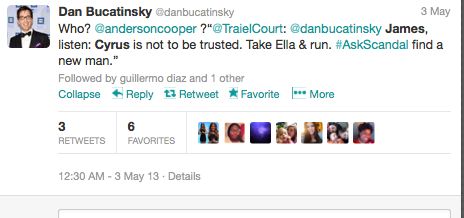
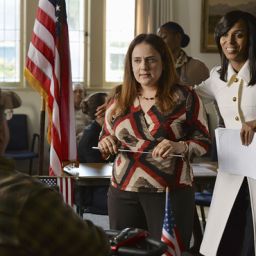
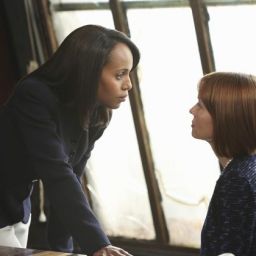

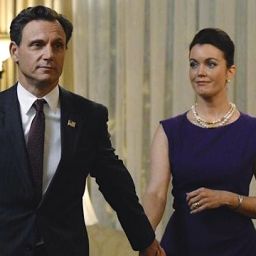
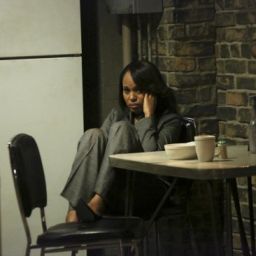
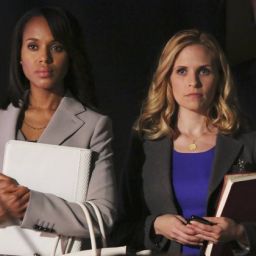
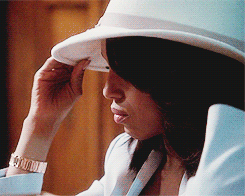
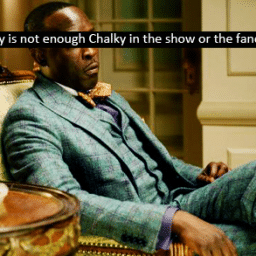
a) THIRTY YEARS? That’s crazypants.
b) Olivia’s speech (via Fitz), while insane, would actually work in the real world. We’re so fucking fascinated with the love lives of our pols, celebs, etc. Everyone would fawn at him dating the respectable white women that when he started dating Olivia (with that resume of Fitz-related good deeds), they’d have no choice but to fawn. Even if they were secretly uncomfortable with it.
c) In reality, a president in an inter-racial relationship with a gay Chief of Staff would be amazing.
d) I’ve never heard the term Mary Sue. Now I want to find all of them, for forever.
e) I like you/this article enough that I actually logged in to the website to post. Hooray!
OH WAIT.
f) I love Josh Malina in everything he does.
Thanks for reading!!! It’s scary to think that such a speech could actually work , it’s such a cynical view of relationships, race, you name it, and yet… but that’s what really fascinates me about this show, is how completely amoral people are.
here is more on Mary Sue’s if you are interested: http://tvtropes.org/pmwiki/pmwiki.php/Main/MarySue
I knew the general term of “Mary Sue” (having been accused of it), but that Wikipedia article is quite illuminating!
For what it’s worth, I don’t have cable and almost never watch TV, but I’m utterly addicted to Scandal. So glad it got picked up for a third season.
“But maybe, just maybe we aren’t looking for positive. Maybe we are looking for over-the-top, morally gray, complicated, nutty.”
OMG THIS YES. i’ve lost count of how many “how can you possibly root for olivia?” conversations i’ve had since scandal started, and people really think i’ve gone off the deep end when i explain that part of olivia’s charm for me is all of her complicated crazy messiness. life isn’t simple and positive and i, for one, welcome a (anti-)heroine who reflects that reality, no matter how insane it may be.
[…] loved Keidra’s discussion regarding Olivia Pope, anti-hero, because it was refreshing to see a discussion on how a WOC can lead a show, and SURPRISE! not be […]